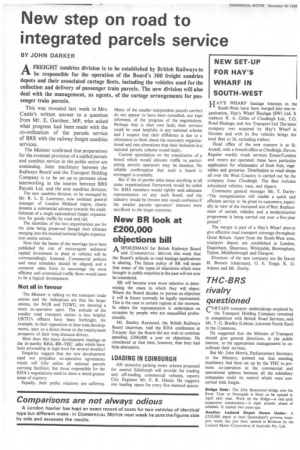New step on road to integrated parcels service
Page 16

If you've noticed an error in this article please click here to report it so we can fix it.
BY JOHN DARKER AFREIGHT sundries division is to be established by British Railways to be responsible for the operation of the Board's 300 freight sundries depots and their associated cartage fleets, including the vehicles used for the collection and delivery of passenger train parcels. The new division will also deal with the management, as agents, of the cartage arrangements for passenger train parcels.
This was revealed last week in Mrs. Castle's written answer to a question from Mr. E. Gardner, MP, who asked what progress had been made with the co-ordination of the parcels service of BRS with the railway freight sundries services.
The Minister confirmed that preparations for the eventual provision of a unified parcels and sundries service in the public sector are continuing. Joint machinery between the Railways Board and the Transport Holding Company is to be set up to promote close interworking in the interim between BRS Parcels Ltd. and the new sundries division.
The new sundries division, to be managed by Mr. R. L. E. Lawrence, now assistant general manager of London Midland region, clearly denotes a substantial advance towards the establishment of a single nationalized freight organization for goods traffic by road and rail.
The identities of the two organizations are for the time being preserved though their ultimate merging into the mooted national freight organization seems certain.
Now that the banns of the marriage have been published the risk of extravagant unilateral capital investment in plant or vehicles will be correspondingly lessened. Commercial policies and rates schedules should be aligned, and a common sales force to encourage the most efficient and economical traffic flows would seem to be a logical development.
Not all in favour
The Minister is talking to the transport trade unions and the indications are that the larger unions. the NUR and TGWU, are showing a more co-operative spirit. The attitude of the smaller road transport unions is less helpful. URTU's officers have been forthright, for example. in their opposition to liner train developments, seen as a direct threat to the employment prospects of their long-distance drivers.
How does this latest development impinge on the tri-partite RHA—BR—THC talks which have been proceeding at high level for several months?
Enquiries suggest that the new development need not prejudice co-operative agreements which will fully utilize all national parcels carrying facilities; but those responsible for the RHA's negotiations need to show a much greater sense of urgency.
Equally, their public relations are suffering. Many of the smaller independent parcels carriers do not appear to have been consulted, nor kept informed, of the progress of the negotiations. Perhaps that is their own fault; their services could be used helpfully in any national scheme and I suspect that their diffidence is due to a reluctance to think about the necessary organizational and rate alterations that their inclusion in a national parcels scheme would imply.
Current speculation on the constitution of a board which would allocate traffic to participating parcels operators may be baseless. No reliable confirmation that such a board is envisaged is available.
But if the tri-partite talks mean anything at all some organizational framework would be called for. RHA members would rightly seek adequate representation on any such board, and the industry would be thrown into vexed confusion if the smaller parcels operators' interests were sacrificed to the larger concerns.
New BR look at £200,000 objections bill
A SPOKESMAN for British Railways Board told COMMERCIAL MOTOR this week that the Board's attitude to road haulage applications is altering. The future policy of BR will mean that many of the types of objections which were brought to public enquiries in the past will not now be considered.
BR will become even more selective in determining the cases to which they will object. Where the Board decides to pursue an objection it will in future normally be legally represented. This is the case in certain regions at the moment. In others the representation is undertaken on occasion by people who are unqualified professionally.
Mr. Stanley Raymond, the British Railways Board chairman, told the RHA conference at Torquay that the Board did not wish to continue spending £200,000 a year on objections. He considered at that time, however, that they had little alternative.
LOADING IN EDINBURGH
AN extensive parking meter scheme proposed for central Edinburgh will provide for loading and off-loading commercial vehicles, reports City Engineer Mr. F. R. Dinnis. He suggests one loading space for every five metered spaces.




















































































